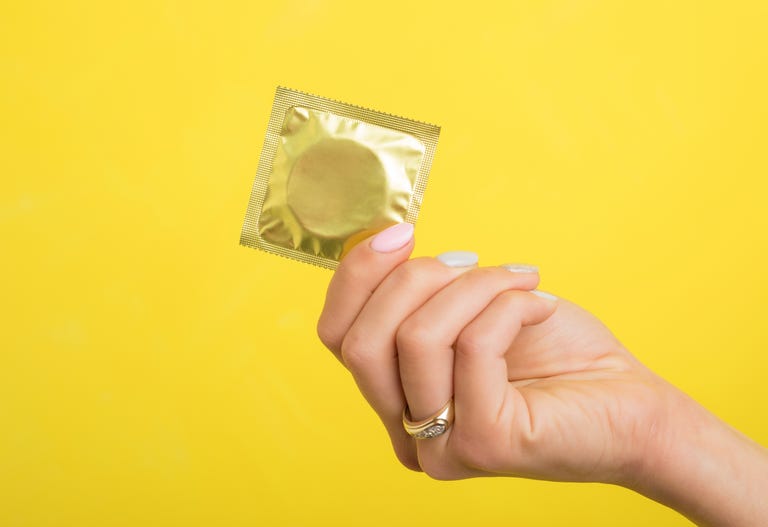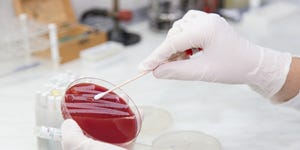
Sex may be super fun—and, you know, essential to maintaining the human population—but it can also come with some damn uncomfortable consequences…like the more than 20 different types of STIs.
Gonorrhea’s just one of those super-scary infections—but it’s one that definitely needs to be on your radar. With an estimated 820,000 new cases each year, gonorrhea is the second most commonly reported notifiable disease (i.e., you’re legally obligated to tell someone if you have it) in the U.S., according to the Centers for Disease Control.
Scary, huh? But before you go swearing off sex forever, it’s important to know exactly what you’re dealing with when it comes to gonorrhea. Because knowledge is your best form of protection—well, after abstinence and condoms.
What is gonorrhea?
Gonorrhea, a.k.a. “the clap” is an STI caused by the Neisseria gonorrhoeae bacterium, per the CDC, and is spread though the sexual contact with the penis, vagina, mouth, or anus of an infected partner.
The bacteria infects the mucous membranes (basically, any opening to the body), and is commonly found in the cervix, uterus, and fallopian tubes in women, and the urethra in both women and men. But the STI can also affect the mouth, throat, eyes, and rectum.

It’s seen most often in men and women ages 15 to 24–of the estimated 820,000 new cases each year, 570,000 are among young people—but anyone who’s having unprotected vaginal, oral, or anal sexual contact can get or spread the infection. Also, fun fact: Ejaculation doesn’t have to occur for transmission.
What are the symptoms of gonorrhea?
Much like chlamydia, gonorrhea is hard to recognize. In fact, most women and men are asymptomatic, according to the CDC. That means they don’t experience any changes once they’re infected, says Suzanne Fenske, M.D., assistant professor of obstetrics, gynecology, and reproductive sciences at Icahn School of Medicine at Mount Sinai in New York City.
“I didn’t have symptoms and nothing was unusual or felt weird to me.” –Ashley, 25
If symptoms do show up, they usually occur within 10 days of exposure to the bacteria. They can be mild and mistaken for a UTI or yeast infection—like vaginal itching and discharge—but if you’re having any of the following symptoms, it’s a good idea to get them checked by a doctor.
Vaginal itching
Gonorrhea can cause uncomfortable itching in and around the vagina, says Fenske. If this feeling persists, tell your doctor and ask for an STI exam.
Abnormal vaginal discharge
Depending on where you are in your menstrual cycle, discharge is pretty common, but gonorrhea can cause women to produce more discharge than normal, says Fenske.
If you notice any differences in discharge—like an unusual color, consistency, or smell—either on your toilet paper or in your underwear, make sure to tell your doctor. It should be noted that a change in discharge doesn’t always mean you have gonorrhea, but it’s still a safe bet to get checked out.
Vaginal bleeding between periods
There are tons of reasons why you could experience spotting between periods, like stress or having a condition like PCOS. But gonorrhea could also be the cause, says Fenske. If this isn’t typical for you, make an appointment with your ob-gyn.
Painful and frequent urination
When gonorrhea infects the urethra, it can cause symptoms similar to a urinary tract infection (you know, that familiar burning sensation when you pee and the feeling that you need to go constantly). If you’ve recently had unprotected sex and are experiencing these symptoms, check in with your doctor.
Pelvic or lower abdominal pain
Left untreated, cervical gonorrhea can spread to the uterus and fallopian tubes, causing pelvic inflammatory disease. PID can lead to fertility issues in one in eight women, reports the CDC.
As it progresses, PID can cause fevers, pain, and sepsis, as well as chronic pelvic pain, says Fenske. PID pelvic pain can be similar to what you might feel during your period, but it will occur outside of your typical cycle.
Again, this is only if gonorrhea is left untreated, so make sure to get tested regularly to help protect against STIs spreading and causing PID.
Anal itching, soreness, or bleeding; or a sore throat
In some cases, rectal gonorrhea infections may show up as anal itching, soreness, bleeding, or painful bowel movements, according to the CDC. An infection of the throat may cause a sore throat—but in many rectal and pharyngeal infections, gonorrhea is asymptomatic.
How is gonorrhea diagnosed?
“If symptoms are present, then most people will be diagnosed with gonorrhea within two weeks of exposure,” says Fenske. Women who suspect they have gonorrhea can be diagnosed with a vaginal swab test or a urine test, which you can get at a walk-in clinic, or from your primary-care doctor or ob-gyn.
Only about 90 percent of cervical gonorrhea cases are found via urine tests, says Fenske, so a vaginal swab for suspected cervical gonorrhea is your best option.

Men, however, are most often diagnosed through urine tests. And, for suspected gonorrhea from oral or anal sex, swabs of the mouth and throat or rectum can also lead to a diganosis.
But, if you’re not showing any signs or symptoms of the STI, it’s possible you won’t be properly diagnosed until you have a routine STI test (during your annual exam with your ob-gyn, for example), or if the infection spreads and begins causing pain from PID, says Fenske.
How is gonorrhea treated?
Some good news: Gonorrhea is totally treatable and a relatively easy STI to deal with, says Fenske. Your doctor will likely give you a one-time shot of an antibiotic called Ceftriaxone along with one large pill dose of Azithromycin. “There have been rising levels of resistance of gonorrhea infections to antibiotics,” says Fenske, “and the two antibiotics together provide the best coverage for treatment.”
“It just made me feel really trashy even though…it happens all the time to people.” –Tara, 22
According to the CDC, if your symptoms continue for more than a few days after receiving treatment, head back to your doctor, as you may have a strain that’s resistant to certain antibiotics. “When uncomplicated gonorrhea infections are treated with antibiotics, it clears up within one day.”
Make sure you and your partner(s) wait at least a week after finishing treatment, assuming you’re no longer symptomatic, to have sex again. After that, you’re in the clear.
How can you prevent getting gonorrhea?
Like most STIs, the best way to protect yourself against gonorrhea is through abstinence or a long-term monogamous relationship with a partner in which you’ve both been tested, according to the CDC.
But, because that’s not always entire possible, latex or polyurethane condoms and dental dams are your second best bet if you’re having sex with multiple partners, says Fenske.

Of course, gonorrhea can still be spread by sexual contact before a condom goes on. To truly be safe, get tested with each new partner before having sex, so you know for sure where you stand, and get tested regularly on your own too.
What real women want you to know about gonorrhea:
Jenelle Marie Pierce, founder of TheSTDProject.com and Spokesperson for PositiveSingles.com, asked several women with gonorrhea to share their experiences with WomensHealthMag.com.
“I wouldn’t have known that I had it if it weren’t for my best friend getting it… Her ex told her that she might have an STI, and so I went with her for moral support—there’s a Planned Parenthood right around the corner, and I agreed to do testing too. I didn’t expect anything to come back positive—I didn’t have symptoms and nothing was unusual or felt weird to me—so when it did, I flipped out. I cried and everything. To find out that I had an STI, one that people have been saying is sometimes incurable, and that I had no idea how long I’d had it, just made me feel really gross.
“But treatment was easy, just a prescription. I didn’t have to wait a very long time to have sex again, just until my treatment was done. I want people to understand that everyone can get STIs. I used to think that it was just people who slept around or that I wasn’t sleeping with those kinds of people, like you could tell or something, but the truth is you can’t tell and most people get an STI at some point. It’s scary but it’s not the end of the world, and I just wish people knew that it’s not as big of a deal as everyone makes it out to be.” —Ashley, 25, Colorado Springs, CO
“I’m not sure if my symptoms were from the gonorrhea or because I was also sick at the time. I had the flu for a few weeks, and I just wasn’t getting any better, so I finally went to the health center on campus, and they asked me about STI tests. I didn’t want to get one done, but the lady convinced me that it wasn’t a big deal, so I just said yes. I definitely didn’t think that how I was feeling was because I had an STI though.
“I still wonder how long it would have taken before I found out if I hadn’t gotten sick like that. Untreated gonorrhea can be really bad for women if you want to have kids one day, and I definitely do, I want a big family. When they told me that my results were positive I got really worried, because I didn’t know I was exposed. I mean, I’m not a person who hooks up a lot, so I really didn’t think I had anything to worry about, and I was really worried that I wouldn’t be able to have kids.
“They gave me a shot and a prescription and I took that until it was done. My flu went away a week or so later, I think—it wasn’t long. I wasn’t in a relationship though, so I didn’t have sex with anyone right away, and I didn’t really want to, because I was really worried for a while about getting something again.
“It just made me feel really trashy even though I know it shouldn’t have and it happens all the time to people. I didn’t have a partner then, but if I had to tell someone that they should get tested I’d use one of the anonymous apps that are out there. I didn’t even know they existed until I read about it online, but I can see why people would use them because there’s a lot of stigma around getting an STI—people can be mean and say some pretty nasty things about people with STIs.
“Lately I’ve been talking about getting tested and told my partner that I get tested and asked him if he had been, which I never used to do, so I feel like I’ve gotten a lot smarter and am more responsible now. I didn’t know that you can’t always tell whether or not you or someone you know has an infection, and that’s changed my whole perspective about getting tested and judging people who have an STI, because it can happen to anyone.” —Tora, 22, Brooklyn, NY
Source: Read Full Article
